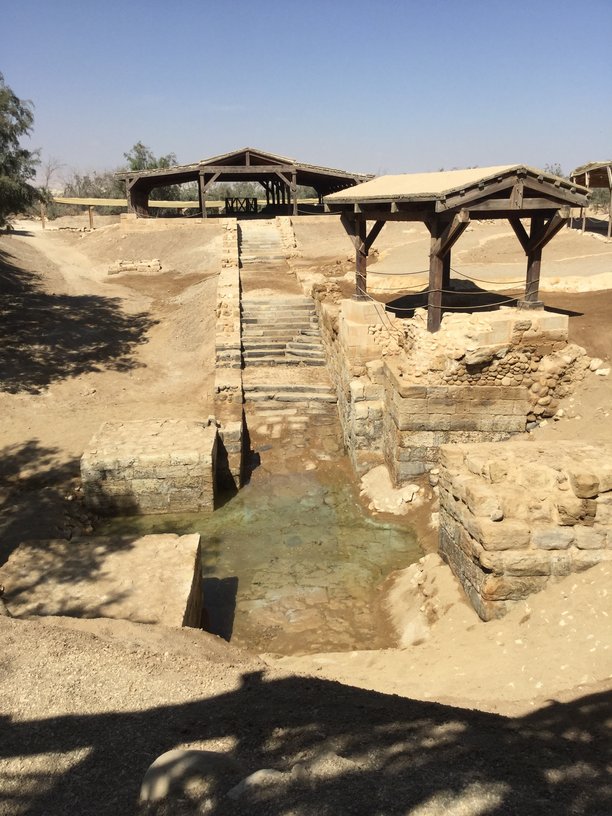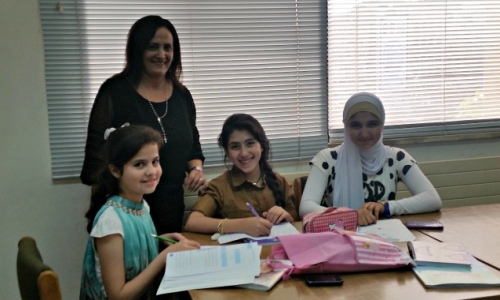Jordan’s Prophetic Vision of the Middle East: A Land of Muslim-Christian Harmony
Christians and Muslims in Jordan believe that their country — the Holy Land’s east bank — provides a vision of what the Middle East could become again.

AL-MAGTAS, Jordan — A massive ancient stone baptistery, built into the ground in the shape of a cross, marks the spot in Jordan where Jesus was baptized.
Surrounded by Christian pilgrims, Rustom Mkhjian, the assistant director of the Baptism Site, with the affection more akin to a devoted son introducing his family than a caretaker, recounted how Christian pilgrims would descend the stone steps into the baptistery, still fed by the Jordan River.
Sacred stillness and peace permeate the air around the site, where the remains of churches and basilicas stand sentinel, as Mkhjian described how the early Christians fought over and over with the forces of nature, both floods and earthquakes, in order to establish houses of worship for pilgrims in a place that served no Christian community.
“And why? Because this is the place where Jesus was baptized and Christianity was started,” he said, gesturing toward the holy site.
But Mkhjian, a Jordanian Catholic of Armenian descent, draws his audience’s attention to another dimension of the baptismal site: the “human mosaic” that reveals the prophetic mission of Jordan, a land of prophets that can give the Middle East a new vision of religious harmony and peace.

Prince Ghazi bin Mohammed, the king’s cousin, led the restoration of the site and has encouraged its revival as a place where monks, nuns and priests can pray and minister to pilgrims. Thanks to this vision, popes since St. John Paul II have come as pilgrims — this past Epiphany, the Latin Patriarch of Jerusalem led 5,000 pilgrims in a procession culminating in Mass here.
“Here, the cross and the crescent live in harmony together,” Mkhjian said. “Let’s hope it continues that way.”
The Cross and Crescent Together
Christian-Muslim cooperation and harmony permeates Jordanian society at all levels. Jordan has a lively Christian presence that not only serves the Muslim majority, but closely collaborates with Muslims.
“We are the experts on living with Islam,” Father Nabil Haddad, a Melkite Greek Catholic priest and leader of interfaith dialogue in Jordan, told the Register.
The new Pope Francis Center erected on the complex of the St. Peter and Paul old Melkite cathedral, his parish in Amman, opened on time on Oct. 14, he said, thanks to his Muslim engineer. Father Haddad said the man personally believed in the need for the center and worked overtime to bring the project to completion. He added that many Muslims, including the kingdom’s minister of Islamic affairs, came to the inauguration to offer congratulations.
“We need to work together, and I think this is the only way to stop the worsening situation [in the Middle East],” he said.
In the north of Jordan, at the Mother of Mercy Clinic in Zarqa, Dominican sisters work with Muslim doctors and nurses to provide general health care services, as well as health care for pregnant women and babies; the center is primarily for people who cannot afford regular clinics.
“We serve everyone here,” said Sister Miriam, one of the three Dominican sisters at the clinic, adding that patients feel “safe and comfortable here.”
“They feel treated like a person,” she said. The charge per visit is 3 Jordanian dinars (or $4.20), and drugs are provided at discounted rates. But patients pay what they can, and if they have no money at all, she said, “We treat them for free.”
From 8am until 2pm, Dr. Hanin Mohammed sees 75 to 100 patients a day. Most are poor Jordanians, but she also sees refugees from Syria and Iraq, as well as Palestinians and even Bangladeshi migrant workers. She told the Register that she enjoys working with the sisters at the clinic.
“When the patient says, ‘I get better,’ this makes us happy,” she said.
In Amman, the sisters of the Teresian Association run the Pontifical Mission Library, serving both the local population as well as the Christian community. The library functions as a community center hosting public lectures, prayer sessions, Christian formation classes and English grammar lessons.

A given day at the library might have Muslim and Christian schoolgirls doing their homework and Iraqi Christian refugees learning English or just coming together as a community to meet and pray.
“We study music in the library,” Rose, a 12-year-old Christian girl from Iraq, told the Register. “The sisters are very good to us.”
Amman-Philadelphia: City of Brotherly Love
Jordan is an ancient land with a rich heritage of civilization that provide its identity as “the sunrise of faith.”
“The three Abrahamic religions started here, and that is why we call it the sunrise of faith,” said Amman’s mayor, Aqel Biltaji. He pointed to the travels of Abraham, Moses, St. John the Baptist and Jesus, adding that, for Muslims, “Muhammad received his prophecy in Jordan.”
Originally built on seven hills, the 9,000-year-old city once occupied an important stop on a trading route known as the King’s Highway and was known first in biblical times as “Rabbath Ammon,” the capital of the Ammonite kingdom. It later was named by its Egyptian Ptolemaic conquerors as “Philadelphia,” until Muslim Arabs conquered the region in the 630s and named the city “Amman.”
Arab Christians and Muslims, he pointed out, are both the descendants of Ishmael. He said Jordan is celebrating the centennial of the 1916 Arab revolt, but explained that King Hussein, the sharif of Mecca, had initiated the uprising in part to “come to the rescue of the Armenians” and protect the Christians facing genocide from the nationalist Ottoman Turks.
The mayor said the sharif, whose son Abdullah founded the Hashemite dynasty in Jordan, issued a decree to his sons saying that Christians in their lands were “the protected people of the Muslims” and that defending them as they would themselves was “among the most important things we require of you to do and expect you to accomplish”
The Christian presence, he said, enriches Jordanian society. The mayor, who attended a Quaker school as a youth, said most educated Muslims in Jordan “go to Roman Catholic schools.” Most of the Catholic schools’ pupils are Muslim, he added, and likely have a Muslim headmaster or headmistress teaching alongside Catholic nuns.
The mayor said the present challenge in the Middle East is that Muslims once again have to confront the “Kwariji” — the “outlaws of Islam.” Back in the seventh and eighth centuries, this fanatical sect arose following the death of the Prophet Muhammad, carried out mass slaughters, particularly of Muslims they regarded as not true Muslims. Muslims back then had to set aside theological differences and unite to put down this violent, bloodthirsty sect. And the sect had reared its head once again with the rise of the Islamic State group, al-Qaida and other such groups, according to the mayor.
He said, for them, jihad is “a suicidal attempt,” but for Muslims like himself, it is “a fight within oneself” to overcome those faults and sins that offend God. “That is proper Islam,” he said.
“Yours truly is a target,” the mayor said. “I am on the [kill] list of ISIS for what I say and who I am.”
Complex Religious Landscape
Jordan’s constitution declares that Islam is the state religion in Jordan, and the king must be Muslim. The law and the constitution allow a person to practice religion freely, provided it does not violate “public order or morality.” However, the picture becomes more complicated in regard to converts from Islam to Christianity or Christianity to Islam, as well as for unrecognized religious groups, such as U.S. evangelicals, Mormons and Jehovah’s Witnesses.
The U.S. State Department’s “Jordan 2015 International Religious Freedom Report” stated the constitution and civil law do not forbid conversion, but the proselytizing of Muslims and conversion from Islam is effectively prohibited because civil law does not extend to all personal matters. The report explains that, in personal matters such as religion, family law or inheritance, a person falls under the jurisdiction of religious courts. Muslims fall under the jurisdiction of sharia (Islamic law) courts, which forbid conversion from Islam. At the same time, the sharia courts bar mixed marriages between a non-Muslim man and a Muslim woman and will not recognize the validity of a Christian woman’s marriage if she converts to Islam without her husband.
The government also monitors Christian conversions to Islam over concerns that some Christians use them as a backdoor way to get a divorce, because most of the recognized Christian religious courts, such as the Latin and Melkite Catholic tribunals, do not recognize divorce in their canon law.
The report also said that the State Security Court can prosecute proselytizing individuals for violating “the public order,” noting that one foreign national was deported.
Mayor Biltaji explained that Jordan is a tribal-based — not individual-based — society, and while conversions do occur, the laws are designed to minimize religious friction within tribes and between tribes. He said one of the problems with mixed marriages is that they create conflict: Islamic laws require children to take the religion of the mother, whereas the historical churches require children to be baptized and raised in the faith of the Christian parent. At the same time, he said, the main problems in Jordan with proselytization do not actually involve Muslims, but unrecognized U.S.-based Christian groups aggressively proselytizing the members of “the historical Christian churches,” who have complained loudly about this to the government.
A Model for Peace
Jordan offers an alternative to many Western nations, where increasingly religion is viewed as a problem and no religion is viewed as the solution. The kingdom tries to set an example of religious harmony: Members of the royal family and the king’s ministers were on hand with other foreign dignitaries to celebrate the renovation of the newly re-opened Memorial of Moses on Mount Nebo and emphasized how it was a place holy to Jews, Muslims and Christians.
Father Haddad told the Register Jordanian society continues to be “anti-hatred” in its mentality, but cannot afford to take it for granted. He said the country showed solidarity to Christians, and particularly King Abdullah II, after a Muslim fundamentalist came back from pilgrimage to Mecca and shot dead a man from a Christian tribe who had been just acquitted of charges of slandering the Prophet Muhammad.
Islamist extremists have tried to infiltrate Jordanian society and subvert the country’s traditional Islam by targeting the youth, 30% of whom are unemployed, according to The Wall Street Journal.
Father Haddad said keeping Jordan as a symbol of hope takes work between Muslims and Christians of goodwill and building stronger bonds. He said the Pope Francis Center aims to promote that interreligious dialogue, particularly among youth.
The priest believes Jordan’s society can provide a model of coexistence, not only for Syria and Iraq, embittered by sectarian strife, but also for the Israelis and Palestinians on the other side of the Jordan River.
“The destiny of the people of this region is to live side by side,” he said. “If we believe this is our destiny, then we can move to the next step.”
Peter Jesserer Smith is a Register staff reporter.
He traveled on pilgrimage to Jordan with a group of
religious writers sponsored by the Jordanian Tourism Board from Oct. 7-15.

















